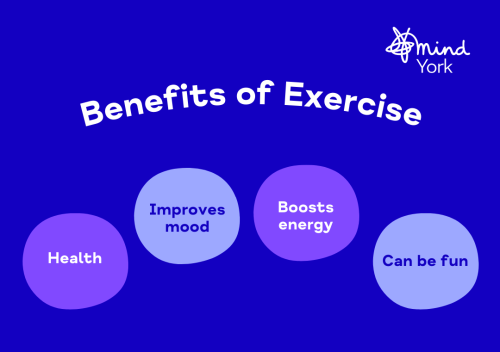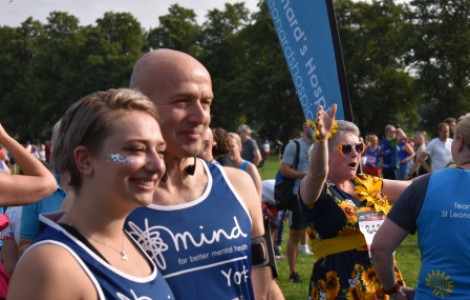During and after exercise, people tend to find that their mood is uplifted, which is likely a result of changes to certain hormones in the body, coupled with a sense of accomplishment that comes from finishing a bout of physical activity. Exercise can also act as a distraction from a racing mind or unhelpful thoughts; many forms of exercise require concentration, which can shift our focus and stop spiralling thought cycles in their tracks. Pair this with a release of feel-good hormones and it’s easy to understand why we feel so good after a brisk walk or game of tennis! When we exercise regularly, we start to also feel the long-term benefits, which include improved sleep, self-esteem, and energy levels.
Posted: 18th January 2023
Exercise and Mental Health: What’s the Link?
Written by Simon Taylor, Head of Corporate Wellbeing for York Mind
There are lots of good reasons to be physically active if you’re able, and staying mentally healthy is one of them. There are lots of studies that have found regular exercise can help to prevent and even treat depression in some cases, as well as help people to manage symptoms of anxiety and other mental health disorders. What’s more, exercise can be a great stressbuster, acting as a positive coping mechanism for dealing with life’s daily stressors. To understand how exercise is so beneficial for our mental health, we need to look at both the short- and long-term effects of exercise on our body, emotions and thoughts.

1Benefits of Exercise on Mental Health
2What Type of Exercise Should I do?
We don’t need to spend every waking moment on a treadmill to experience the benefits of exercise; 150 minutes of moderate intensity exercise per week is recommended by the UK government, but you should do what you feel you can and increase your activity levels gradually. It’s also important to remember that exercise doesn’t have to be very intense for you to experience these benefits. In fact, moderate-intensity exercise (where your breathing is increased and you feel a little warmer), is shown to uplift our mood both during and after exercise, whilst more vigorous exercise tends to improve our mood more so afterwards.
The great thing about exercising for our mental health is that any type of exercise is beneficial, so whether you prefer to lift weights in the gym, play a team sport, or go out for a bike ride, it all counts! There is extra benefit when you join a club, as social connection can help us to experience more positive emotion day-to-day. And whilst any form of exercise will help to boost your mood and improve your sense of wellbeing, some studies have found that Yoga can be particularly beneficial for helping to feel relaxed and reducing the likelihood of experiencing depressive symptoms.
3How Should I Start and Maintain my new exercise routine?
Starting a new exercise routine can be scary, but it’s important to do what you feel comfortable with, as doing so will help you to stick with it in the long-term. This means that dragging yourself to the gym three times per week may not be the best option if you would prefer to be out playing a game of netball or doing a steady jog around your local park. And whilst gyms are a great place to get fit if you make use of the variety of equipment, there are additional benefits associated with getting outside in nature on a regular basis. To help you decide what to do, you may think about what types of exercise you have enjoyed in the past, and start small. It can sometimes be useful to join a club or get some advice from a professional such as a Health Coach or Personal Trainer to increase your confidence if you’re not sure what exercise would be best for you.
Sticking with exercise can be a challenge. We know, for example, that a high percentage of New-Year’s resolutions tend to be broken in the first few weeks of being set. So how can you tee yourself up for success? You may like to try setting yourself small goals over the first few weeks and adapt your environment to make it as easy as possible to exercise. For example, try getting your sportswear or equipment ready the day before you plan to exercise, or set a calendar reminder for the time when you plan to exercise. Using a structured programme such as the NHS Couch to 5k can also be useful to help set a routine and get started with something new.
4What if I Can’t Exercise?
It’s important to remember that everyone will have different experiences of exercise and its impact on their mental health. That means that it might not be right for everyone all the time, particularly if you have an eating disorder, physical disability or find it overly stressful to fit into a busy schedule. In this case, it can be useful to find other ways of handling your emotions and coping with stress. Alternatives include Mindfulness meditation, journaling and being social, which you can find out more about on the National Mind website. If you feel unwell, it may be particularly difficult to get up and exercise, so don’t be hard on yourself if you can’t exercise on a particular day, week, or month, and talk to a professional if you are struggling to maintain your health as a result of a mental health problem you are experiencing. If you need someone to talk to, but don’t have access to a Counsellor or Therapist, there is a list of organisations you can contact here.
Personally, I have always found exercise an important part of my routine for handling stress; it gives me an outlet, chance to remain social and a distraction from the daily stressors of life. I hope that the information in this article is useful and that it inspires you to start exercising and experiencing some of the benefits I have felt. If you would like more information on how exercise can help you, visit the NHS website.
If you live in York and feel that you would benefit from accessing any of our services including Counselling and activity groups, please visit the York Mind website, where you can find information about the services we offer.




